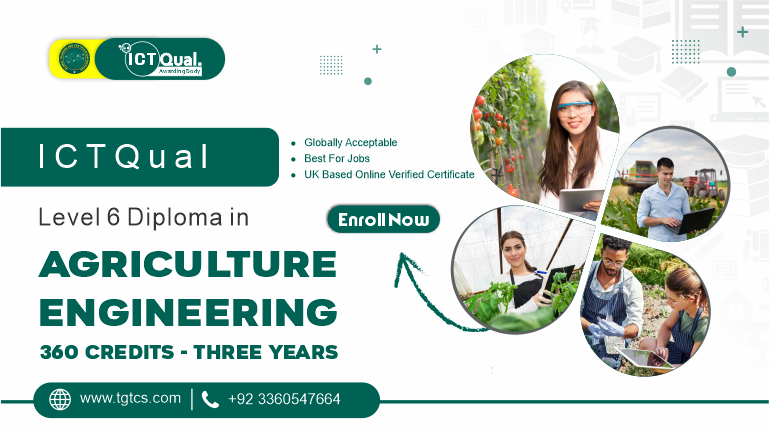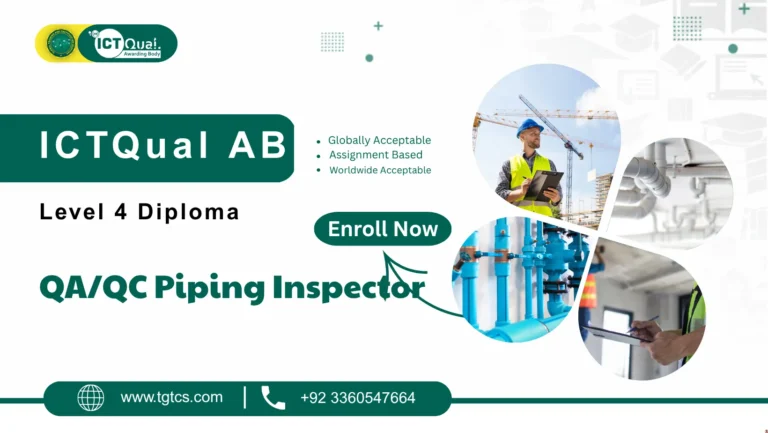ICTQual Level 6 Diploma in Agriculture Engineering 360 Credits – Three Years
In an era where sustainable farming and efficient agricultural practices are more important than ever, the ICTQual Level 6 Diploma in Agriculture Engineering provides the skills and expertise needed to meet the growing demands of the agricultural industry. This comprehensive, three-year program (360 credits) is ideal for individuals looking to advance their careers in agricultural engineering, offering a blend of theoretical knowledge, practical skills, and industry insights. Whether you’re seeking to work in agricultural machinery design, environmental management, or precision farming, this diploma can open the doors to a variety of exciting career opportunities.
The ICTQual Level 6 Diploma in Agriculture Engineering is a specialized qualification designed to equip students with the necessary knowledge and skills to pursue a career in agricultural engineering. Covering everything from machinery operation to environmental sustainability, this program is a key stepping stone for those wishing to work in industries such as farming, food production, agricultural technology, and land management. By the end of the course, students will be prepared to design, implement, and optimize systems that improve agricultural productivity while maintaining environmental responsibility.
The ICTQual Level 6 Diploma in Agriculture Engineering is an excellent choice for those looking to enter or advance in the agricultural engineering field. With its strong focus on both engineering and agricultural sciences, hands-on learning, and emphasis on sustainability, this course ensures that you will be well-prepared for a dynamic and rewarding career in agricultural technology and innovation.
The Global Training and Certification Services (TGTCS) is Directly Approved Training Centre of ICTQual
The ICTQual Level 6 Diploma in Agriculture Engineering is a comprehensive three-year program designed to equip students with the skills and knowledge required for a successful career in agricultural engineering. Covering 360 credits, this qualification blends engineering principles with agricultural science, focusing on areas such as farm machinery design, irrigation systems, precision farming, and sustainable agriculture practices.
Throughout the course, students will gain expertise in optimizing farm operations, managing resources effectively, and minimizing environmental impacts. The program includes both theoretical knowledge and hands-on learning, with opportunities for industry placements and real-world projects. Graduates of this diploma are well-prepared for diverse roles in agricultural engineering, farm management, environmental consultancy, and agricultural technology.
This qualification offers multiple career pathways and is ideal for individuals interested in improving agricultural productivity while promoting sustainability. It also provides a solid foundation for further studies or professional certifications, opening doors to a wide range of opportunities in the agricultural and environmental sectors.
Mandatory Units
ICTQual Level 6 Diploma in Agriculture Engineering 360 Credits – Three Years:
Year 1: Foundational Knowledge
- Introduction to Agricultural Engineering
- Basics of Soil Science
- Plant Science and Crop Physiology
- Introduction to Farm Machinery
- Principles of Irrigation and Drainage
- Environmental Science in Agriculture
- Mathematics for Engineers
- Fundamentals of Agricultural Economics
- Introduction to Renewable Energy in Agriculture
- Agricultural Chemistry
- Engineering Drawing and CAD
- Workshop Practices in Agricultural Engineering
Year 2: Intermediate Concepts and Applications
- Advanced Soil and Water Management
- Farm Power and Mechanization
- Agricultural Structures and Materials
- Irrigation Systems Design
- Introduction to Precision Agriculture
- Agricultural Waste Management
- Crop Protection Technologies
- Advanced Farm Machinery Operations
- Principles of Agro-Processing
- Renewable Energy Technologies in Agriculture
- Land Surveying and Mapping
- Practical Training in Agricultural Engineering
Year 3: Advanced Studies and Specialization
- Sustainable Agriculture Practices
- Advanced Irrigation and Drainage Engineering
- Farm Business Management
- Design of Agricultural Machinery
- Precision Farming Systems
- Advanced Soil Mechanics
- Climate-Smart Agriculture
- Renewable Energy Systems for Farms
- Post-Harvest Technology
- Automation in Agriculture
- Research Methods in Agriculture Engineering
- Final Project in Agricultural Engineering
Learning Outcomes for the ICTQual Level 6 Diploma in Agriculture Engineering (360 Credits – Three Years):
Year 1:
- Introduction to Agricultural Engineering
Understand the fundamental concepts and principles of agricultural engineering and its application in modern agriculture. - Basic Principles of Engineering
Establish a solid foundation in essential engineering principles, including forces, motion, and energy. - Farm Machinery and Equipment: Fundamentals
Learn the basic functions, operations, and maintenance of farm machinery and equipment. - Mathematics for Agricultural Engineering
Apply mathematical techniques to solve engineering problems specific to the agricultural industry. - Engineering Drawing and Design
Develop skills to read and create engineering drawings and designs relevant to agricultural applications. - Materials Science in Agricultural Engineering
Understand the properties and selection of materials used in agricultural engineering projects. - Engineering Mechanics
Apply mechanical principles to analyze and solve issues related to agricultural systems and machinery. - Agricultural Systems and Technologies
Gain an overview of various agricultural systems and the technologies that enhance agricultural productivity. - Introduction to Precision Agriculture
Explore the fundamentals of precision agriculture technologies, such as GPS and data-driven farming techniques. - Water Management Systems in Agriculture
Understand the design and function of water management systems used in agriculture to optimize irrigation and water conservation. - Soil Science and Engineering
Learn the relationship between soil properties and agricultural practices, with a focus on engineering solutions for soil management. - Environmental Sustainability in Agriculture
Recognize the importance of sustainable practices in agricultural engineering to minimize environmental impact. - Engineering Safety and Risk Management
Develop skills in identifying, assessing, and managing safety risks in agricultural engineering projects. - Introduction to Renewable Energy in Agriculture
Understand the fundamentals of renewable energy technologies and their applications in agricultural settings.
Year 2:
- Advanced Farm Machinery and Equipment
Gain in-depth knowledge of advanced agricultural machinery and learn to operate them efficiently. - Automation and Robotics in Agriculture
Study how automation and robotics are revolutionizing agricultural practices, improving efficiency, and enhancing precision. - Agricultural Power Systems
Learn to design and implement power systems, including engines and electrical systems, for agricultural applications. - Irrigation and Drainage Systems
Develop expertise in designing and managing irrigation and drainage systems for optimal water usage in agriculture. - Agricultural Structures and Building Design
Understand the principles of designing agricultural buildings such as barns, greenhouses, and storage facilities. - Crop and Livestock Production Technologies
Examine engineering technologies that support crop and livestock production, enhancing productivity and sustainability. - Precision Agriculture Techniques
Develop the skills needed to implement and manage precision farming techniques, including GPS and data analysis tools. - Energy Efficiency in Agricultural Engineering
Learn how to optimize energy usage in agricultural systems, reducing costs and environmental impact. - Agricultural Waste Management
Understand the principles of waste management in agriculture, focusing on recycling and repurposing agricultural by-products. - Computer-Aided Design (CAD) for Agricultural Engineering
Gain proficiency in using CAD software to design agricultural systems and machinery. - Renewable Energy Solutions for Farms
Learn to design and implement renewable energy solutions, such as solar and wind power, to meet farm energy needs. - Surveying and Mapping in Agriculture
Develop skills in surveying and mapping tools to assess and design agricultural land and systems. - Agricultural Biotechnology and Engineering
Explore the intersection of biotechnology and engineering in enhancing agricultural practices and sustainability. - Climate Change and Its Impact on Agriculture
Understand how climate change affects agricultural production and the role of engineering in mitigating its effects.
Year 3:
- Advanced Agricultural Systems Engineering
Apply advanced engineering principles to solve complex problems in agricultural systems and enhance efficiency. - Agricultural Engineering Project Management
Develop project management skills, including planning, budgeting, and executing agricultural engineering projects. - Sustainable Agricultural Practices
Analyze and design sustainable farming practices that promote environmental stewardship and long-term productivity. - Advanced Irrigation and Water Conservation Technologies
Learn advanced techniques for irrigation design and water conservation, optimizing water use in agricultural systems. - Agricultural Equipment Maintenance and Management
Master the skills required to maintain and manage agricultural machinery to ensure optimal performance and durability. - Research Methods in Agricultural Engineering
Gain expertise in research techniques and scientific methods used to address challenges in agricultural engineering. - Innovation in Agricultural Engineering
Explore emerging technologies and innovative solutions transforming the future of agriculture. - Professional Development and Industry Engagement
Focus on skills necessary for professional growth, including networking, career planning, and engagement with industry experts.
Course Benefits of the ICTQual Level 6 Diploma in Agricultural Engineering (360 Credits – Three Years):
- Comprehensive Skill Development
The Level 6 Diploma offers a well-rounded curriculum that integrates engineering principles with agricultural practices. Students gain practical skills in designing agricultural systems, managing farm machinery, and developing sustainable agricultural practices. - Expert Knowledge in Agricultural Technologies
The course covers advanced topics in precision agriculture, renewable energy solutions, automation, and biotechnology, equipping students with the latest knowledge and technologies driving modern agriculture. - Hands-On Learning Opportunities
The program emphasizes practical application through project-based learning, CAD design, surveying, and fieldwork. This hands-on experience prepares students for real-world challenges in the agricultural engineering industry. - Versatile Career Pathways
Graduates of this diploma are well-prepared for a wide range of career roles, from agricultural engineers to environmental sustainability consultants. The course opens doors to diverse industries such as farming, agribusiness, food production, and environmental management. - Focus on Sustainability
With a strong emphasis on environmental sustainability, students learn to design systems that minimize environmental impact, manage resources efficiently, and incorporate renewable energy solutions into agricultural systems. - Industry-Relevant Expertise
The course is designed in collaboration with industry experts to ensure the curriculum remains aligned with current trends and emerging technologies in agricultural engineering. Graduates are equipped with the skills sought by employers in the agricultural sector. - Preparation for Advanced Studies
This diploma serves as a solid foundation for those who wish to pursue advanced degrees or certifications in agricultural engineering, environmental science, or related fields, providing an ideal stepping stone for further academic and professional growth. - Professional Development
The course includes training in project management, professional skills, and industry engagement, preparing students for leadership roles in agricultural engineering projects and fostering entrepreneurship opportunities. - Global Career Opportunities
With a focus on both local and global agricultural issues, graduates can pursue careers internationally, benefiting from the growing demand for agricultural engineers and sustainability experts in countries around the world. - Cutting-Edge Research and Innovation
Students are exposed to the latest research in agricultural engineering and sustainability, encouraging innovation and critical thinking. This prepares graduates to contribute to advancements in the industry, such as developing new agricultural machinery or innovative waste management solutions.
Ideal Learner for the ICTQual Level 6 Diploma in Biotechnology Engineering (360 Credits – Three Years)
The ICTQual Level 6 Diploma in Biotechnology Engineering is designed for individuals who are passionate about the intersection of biology, technology, and engineering. The ideal learner for this course possesses the following characteristics:
- Strong Interest in Science and Technology
The ideal learner should have a keen interest in scientific fields, particularly biotechnology, molecular biology, and engineering. A fascination with how biological systems can be harnessed for industrial, medical, and environmental purposes is crucial for success in this program. - Background in Science or Engineering
This course is suited for students with a foundational background in science (such as biology, chemistry, or physics) or engineering disciplines. Learners with A-levels, or equivalent qualifications, in subjects like biology, chemistry, physics, or mathematics, will have a solid foundation to build upon in this program. Prior exposure to basic laboratory techniques or introductory engineering principles will be advantageous. - Problem-Solving and Analytical Thinkers
Biotechnology engineering involves addressing complex biological and technological problems. The ideal learner should enjoy problem-solving and have strong analytical thinking skills, which are necessary for troubleshooting issues, conducting experiments, and developing innovative solutions to challenges in biotechnology. - Motivation for Innovation and Research
The course is ideal for students who aspire to be at the forefront of biotechnology innovations. The ideal learner should be motivated to engage in research and development activities, contributing to the development of new technologies, processes, and solutions in the biotechnology and life sciences sectors. - Career-Oriented and Ambitious
Learners who are eager to pursue a career in biotechnology, bioengineering, environmental science, or related fields will thrive in this course. Whether the goal is to work in the biotechnology industry, pursue higher education, or start a biotech business, the ideal learner should be focused on advancing their career in these dynamic and growing sectors. - Attention to Detail and Precision
Biotechnology engineering requires careful and precise work, especially when dealing with biological samples, laboratory experiments, and data analysis. The ideal learner should be meticulous, able to follow complex protocols, and maintain accuracy in both experimental and theoretical tasks. - Adaptability and Teamwork
Biotechnology projects often involve interdisciplinary collaboration. The ideal learner should be adaptable, open to learning from various fields, and comfortable working in diverse teams that include scientists, engineers, and business professionals. - Ethical Awareness and Responsibility
Given the ethical considerations in biotechnology, particularly related to genetic engineering, environmental impacts, and medical applications, the ideal learner should possess a strong sense of ethics and a desire to ensure that their work benefits society in a responsible and sustainable way. - Strong Mathematical and Statistical Skills
As biotechnology engineering involves data analysis, biostatistics, and mathematical modeling, the ideal learner should be comfortable with mathematics, including algebra, calculus, and statistical analysis. These skills are essential for interpreting experimental data and optimizing biotechnological processes. - Eager to Contribute to Sustainability
The biotechnology sector is increasingly focused on sustainability, environmental conservation, and improving public health. The ideal learner should be driven by the desire to make a positive impact on the world, whether through innovations in green biotechnology, bioremediation, sustainable agriculture, or healthcare solutions.
In summary, the ideal learner for the ICTQual Level 6 Diploma in Biotechnology Engineering is someone with a strong scientific and engineering background, an interest in biotechnology, and a passion for research, innovation, and solving real-world problems. They should be motivated to make a difference in industries such as healthcare, environmental conservation, and agriculture while developing the skills necessary to excel in this rapidly evolving field.
The ICTQual Level 6 Diploma in Agricultural Engineering provides a strong foundation for a variety of career opportunities within the agricultural sector. Upon completion, graduates have numerous progression pathways to further enhance their education and career. Here are some potential future directions:
- Professional Certifications and Accreditation
- Chartered Engineer Status: Graduates can pursue professional accreditation from reputable bodies such as the Institution of Agricultural Engineers (IAgrE) or other engineering organizations. Achieving chartered status will improve career prospects and establish credibility as a qualified professional.
- Certified Agricultural Engineer: By obtaining specialized certifications in areas such as agricultural machinery, irrigation systems, or renewable energy solutions, graduates can deepen their expertise and focus on niche areas within agricultural engineering.
- Career Advancement in Agricultural Engineering
- Agricultural Engineer: Graduates can pursue roles in designing and developing agricultural machinery, systems, and equipment. They may also work to enhance efficiency and sustainability in agricultural practices.
- Farm Management Consultant: With a strong understanding of both engineering and agriculture, graduates can offer consultancy services to farms, advising on machinery selection, system optimization, and resource management.
- Sustainability Manager: Graduates can take on roles dedicated to promoting sustainable farming practices, incorporating renewable energy, waste management, and environmental conservation into agricultural systems.
- Research and Development (R&D): For those passionate about innovation, R&D roles allow graduates to develop new technologies aimed at improving agricultural production, reducing environmental impact, and enhancing sustainability.
- Entrepreneurship and Innovation
- Starting an Agricultural Engineering Business: Graduates with an entrepreneurial spirit can start their own businesses, offering engineering solutions, agricultural equipment, or consulting services. This could include designing new machinery, developing precision farming software, or providing renewable energy solutions for farms.
- Agricultural Tech Startups: With the rise of agri-tech, graduates can contribute to startups focused on pioneering technologies like automation, robotics, AI, and data-driven farming solutions.
- Industry Leadership Roles
- Project Manager: Graduates with strong leadership and organizational skills can step into project management roles, overseeing large-scale agricultural engineering projects, coordinating teams, and ensuring the successful implementation of innovative technologies.
- Policy and Advocacy: Graduates interested in shaping the agricultural industry can work with government agencies, NGOs, or industry organizations, focusing on policy development related to agricultural engineering, sustainability, and innovation.
- Global Opportunities
- International Roles: The increasing global demand for agricultural engineers presents opportunities to work abroad, particularly in regions focused on modernizing agricultural practices. International organizations and development agencies also need skilled professionals to improve food security and implement advanced farming technologies in emerging markets.
These progression paths offer ICTQual Level 6 Diploma in Agricultural Engineering graduates the opportunity to advance their education, improve their qualifications, and explore a wide range of career prospects in the ever-evolving field of agricultural engineering.
Course Overview
Course Level
Level 6
Course Units
36 Mandatory Units
Duration
Three year






